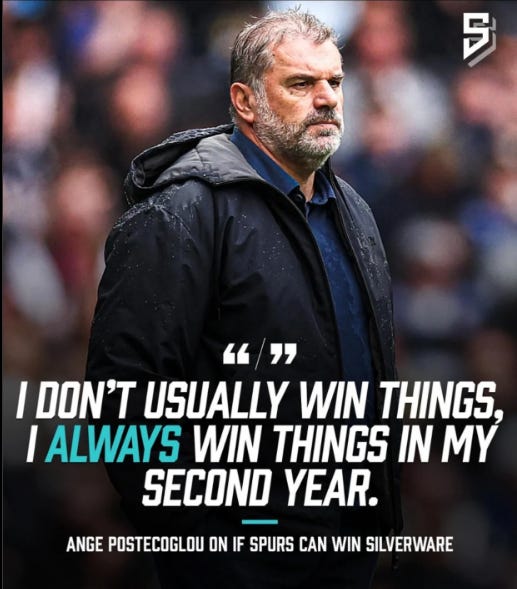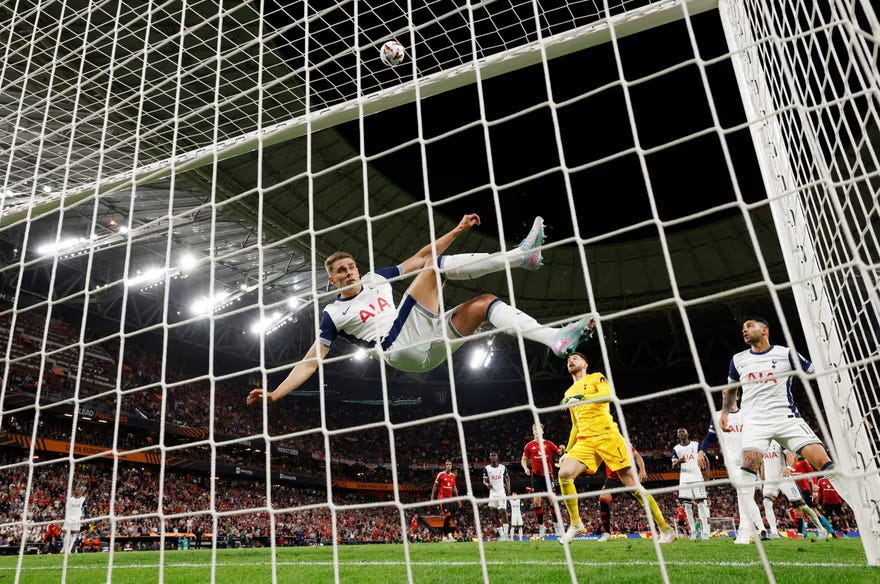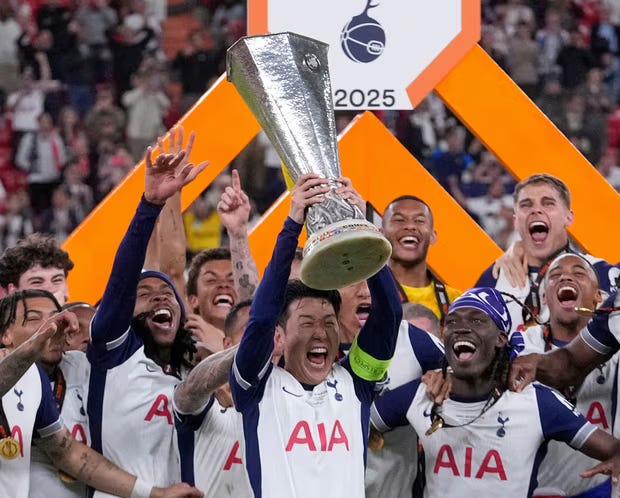To Love is to Surrender
Sacrifice, responsiveness, longing: a review of the Europa League final
Sacrifice
The most provocative chapter of The Value of Others is titled “Love Has Nothing to Do with Relationships”. That proposition isn’t really defended so much as it simply falls out of the author’s word definitions: relationships are “the media in which value is transacted” and love is devotion that seeks nothing in exchange. But the chapter does contain a fascinating overview of how “love” was seen throughout history:
Being shot is not an experience that most people seek out, which is why the Greeks treated those “pierced with Cupid’s arrow” with a kind of pitiable indulgence: a feeling akin to what most modern folks extend to the homeless. Most believed it was an unenviable affliction brought about by a combination of personal weakness and circumstances beyond the individual’s control.
Taraban traces the origin of contemporary romantic love to the 12th-century Cathars who rejected marriage and celebrated chaste longing. After the Catholics massacred the Cathars, romantic love found refuge within the tradition of medieval chivalry as the projection of religious sentiment on a single woman:
Since the transfigured religion is monotheistic, romantics choose one person to elevate above all others as the object of their devotion. This is the origin of oneitis, the affliction whereby romantics humble themselves beneath a pedestalized love object of their own creation. Within their imagination, the love object functionally becomes a god, capable of judging the inherent value of its devotee and either blessing the faithful with ecstatic union (heaven) or damning the unworthy with perpetual separation (hell).
In an act of quasi-religious devotion, a knight would choose a woman to serve as his personal representation of divinity in its feminine aspect, and he would undergo all manner of trials and quests in the name of “his lady fair.” However, to ensure that the game of romance could be played for as long as possible, knights would only dedicate their efforts to women who were married to other men. This would not only ensure the unobtainability of the objects of their devotion but would also effectively prevent the purity of their love from being “tainted” by the gross and corruptive influence of sexual intimacies.
Taraban argues that love has nothing to do with the relations between men and women specifically. It comes from the same place as religious devotion, or the devotion of a fanatic to their idol. It doesn’t matter whether the object of one’s love is Jesus, a K-pop band, or the MILF next door. Love is a sacrifice of the self, “the humiliated self, triumphant”.
This is fascinating, but it doesn’t explain why I love Tottenham Hotspur Football Club. Although Tottenham’s search for a major trophy in the 21st century featured all three of Taraban’s requirements for love — unobtainability, external obstruction, and tragedy — my love entails neither self-sacrifice nor humiliation. And my love would not be diminished if it were consummated. If I were, for example, to watch my Spurs lift a European Cup after defeating an insufferable domestic rival.
Responsiveness
Sasha Chapin says: what humans love is responsiveness. Acting and feeling the world answer back, immediately and positively.
Sasha’s essay starts with a short clip of the most responsive girl to ever order a halal plate, eliciting countless professions of love from men online. Contra Taraban, it seems that men don’t love to self-immolate trying to grasp the unattainable, but to “dance with a great follow”. They want to feel empowered and in control.
I would argue that responsiveness is a core human need/desire. It is, perhaps, required for happiness. People are happy enough rich, and people are happy enough poor. But it’s hard to imagine anyone happy without a feeling that their actions have some impact, however small. Even if you’re not going to be remembered by history, you want to be remembered by your barista. The prisoner, though largely robbed of power, is probably happier if he can vex his captors, or skirt the rules somehow. Life is good if it squishes nicely when you poke it.
When tempted with responsiveness, people will seek to exercise influence even if they know they’d get a better outcome by dropping the reins. They get addicted to video games, day-trade instead of holding an index fund, helicopter parent, micromanage subordinates, and drive stick.
Remove the responsiveness from a game, and it immediately becomes pointless. Remove responsiveness from work, and burnout inevitably follows. Remove responsiveness from a romantic relationship, no matter how well your partner treats you, and it becomes terrifying.
This is insightful, but it doesn’t explain why I love Tottenham Hotspur Football Club. There is no experience less responsive than sitting on the couch emotionally invested in an event I am entirely powerless to control.
It’s not a checked out experience either, like watching a TV show might be. I’ve played soccer myself since I was a kid. I think with the player on the TV as the ball is arriving at his feet, deciding in the same split second whether I would dribble or attempt a pass. My feet twitch as I watch. And yet — I’m perfectly aware nothing I do has any impact on the result. I don’t have rituals or superstitions like many sports fans. I often watch the games alone. And yet — I love it.
One Evening in Bilbao
It was the best of times and the worst of times in North London. Spurs raised eyebrows in 2023 by hiring a journeyman Australian manager with no English football experience. He had one thing going for him: an improbable streak of winning trophies in his second season of coaching a team. Tottenham is run by extremely pragmatic men, but perhaps even they believed that lifting the club’s trophy curse may require some antipodean voodoo.
The system Ange installed was extreme in its intention to wrest control of the game from the opposition. In possession, every Tottenham player was tasked with making quick progressive passes regardless of the pressure they were under. Without the ball, Tottenham would play a high line and press the opposition to try and win the ball back immediately, leaving themselves vulnerable to a counterattack. The approach wouldn’t change regardless of whether Spurs were leading or trailing in the game.
If “Ange-ball” is executed perfectly, the opposition can do almost nothing to counter it. It’s unclear whether any collection of players exists that can execute it perfectly. Tottenham’s certainly couldn’t, though several Spurs injured themselves throughout the season trying to.
Ange-ball caught many teams off guard in his first season in England, and Tottenham finished in 5th place. This qualified them for the Europa League in 2024/25, a continent-wide competition. But in the second season, domestic opponents were ready. They tired out the Tottenham press with sideways passing and sprung easy counters off Spurs turnovers. I watched them lose game after game in England, helpless.
The European campaign didn’t offer much encouragement. Tottenham had to come from behind against mediocre opposition from the Netherlands and Germany, squeaking past each with a single goal margin. In the semi-final, they faced a Norwegian team that was lucky to be there. And yet, in the midst of their worst domestic season in history, Tottenham suddenly found themselves in a European final despite not having played a single good match against a strong opponent.
Tottenham arrived for the final in Bilbao with a rare complement of healthy defenders, without all three of their best creative passers, and with one burning question: would Ange Postecoglou make concessions to the realities of player availability and circumstance? Or would he, knowing that he’s likely to get fired either way, go down swinging with his uncompromising approach?
The final started off with both teams tense and anxious, though perhaps it was just me. Both teams struggled to complete passes, desperately chased long balls, and launched themselves in front of shots. Neither side looked threatening until the 42nd minute, when Tottenham midfielder Pape Sarr hit a speculative low cross to find Brennan Johnson making a near-post run. Johnson lifted his foot and… swung it clear over the ball. The whiff was so bad it caught a United defender by surprise. The ball hit him in his side, then slowly dribbled over the line past the reach of the flailing United keeper.
Without having played a single good attacking move, Spurs were up 1-0 through sheer dumb luck. Ange, who spent years crafting a system to generate good attacking moves no matter the cost, contemplated this strange predicament. At last, he decided to just give it all up.
The second half was some of the worst football I have ever seen in my life. Spurs held 20% possession, committed 10 fouls, and took zero shots. United dribbled the ball around them, lofted inaccurate crosses, and took bad shots from distance. Spurs goalie Vicario made a few good saves. And then, in the 68th minute, he came out for a simple cross in the middle of the box and inexplicably failed to catch it. The ball bounced off his face and right to Manchester United’s striker who headed it towards an empty goal from 10 yards out.
Tottenham’s most athletic player is Micky van de Ven, who unfortunately has missed 20 games in each of the last two seasons with hamstring injuries. But he was there in Bilbao, popping out of nowhere to stretch his hamstrings impossibly high and clear the goalbound header 7 feet off the ground at the goal line. Fans won’t remember many plays from this game, but every single person will remember this one.
It’s poetic that the play of the game had nothing to do with control, or pressing, or anything that a soccer coach can plan or practice for. And for the remaining half hour of the match, Ange watched the game much as I did from my couch: with complete surrender. The team had little tactical instruction beyond sitting back and booting it long. Our hearts sank with every United cross and soared with every block and clearance.
For the remaining half hour, Tottenham blocked every shot and cleared every cross.
Surrender
Look: what can I tell you about love, really? I just wanted an excuse to write about Tottenham and to share links to some great writing. Here’s more of it, from the Museguided Substack:
When you want something – or someone – without being able to explain why, and you choose to move toward it. That is the erotic decision. The moment that cracks open the script you have been given and offers you, terrifyingly, an alternative. Not necessarily better, certainly not safer…. but alive.
It is a metaphysical orientation: the decision, over and over again, to seek intensity over numbness, expansion over contraction, intimacy over control.
Longing, unlike craving, is unruly. It cannot be scheduled, monetised, or disciplined into productivity. That is what makes erotic decisions so destabilising: they can’t be managed. They don’t respond to logic.
With every sentence, every surrender, every sacred mess we choose to enter, life begins anew.
To love is to surrender. Surrender does not have to be sacrificial or humiliating when it is chosen freely. You may not choose which longing calls you, but you can choose to give yourself over to it as a deliberate act, not caring what the Greeks would say about you.
To surrender is to be responsive, to react wholeheartedly to the whim of the beloved with no thought of your own script or even your own identity. Men like halal-cart girl because they also desire to be loved. In a relationship, surrender isn’t a one-way street.
To love is to smile when the other person smiles. Not because you’re transacting with them but because you have surrendered your happiness to theirs. When they smile you are truly happy, in a special and different way from the happiness brought about by your own achievements.
There are some people that get me smiling whenever they smile, no matter how melancholy I was a few seconds before. Terese. Our kids. Son Heung-min.





If Sasha's responsiveness is about having an impact on someone, then your surrender is about allowing ourselves to be impacted
Also, I'll see you at LessOnline :)
I had this realization where making this one person happy just gave me a tremendous return in joy. I used to think it was just that— sympathetic joy, but now I wonder how much of it was also just the other person's responsiveness. Personal note: be more responsive!